DHS Welcomes CCPP Public Hearing: Offers Parking and Shuttle Service.
Posted: May 26, 2017 | Author: Debbie Ellis | Filed under: Administration for Children and Families, CCPP-approved Provider, Child Care Development Fund, Child Care Mississippi, DECCD-MDHS, HHS ACF Office of Child Care, MS Department of Human Services, NAEYC, Quality Rating System, School Readiness Mississippi, SECAC Mississippi, U.S. Commission on Civil Rights, U.S. Department of Health and Human Services, Uncategorized | Tags: 2007 Market Survey Rates, Administration for Children and Families, CCPP-approved Provider, child care quality rating systems Mississippi, MDHS, Mississippi CCDF State Plan, Quality Rating System; DECCD-MDHS; CCDF Quality Improvement, Quality Rating Systems, SECAC Mississippi | Leave a commentDHS Welcomes CCPP Public Hearing: Offers Parking and Shuttle Service.
May 30, 2017
9:oo AM
Second Floor Auditorium
MDHS State Office Building
750 North State Street
Jackson, MS
If you wish to speak, you must sign in 10 minutes prior to the start of the hearing!
Please see the rules of conduct and available parking below.
You can park in lots 5, 6, or 7. The MDHS shuttle bus will also be available to pick individuals up from these parking lots.
SECAC Meeting Cancelled! MLICCI says DHS has Put the “Cart before the Horse”!
Posted: May 24, 2017 | Author: Debbie Ellis | Filed under: CCPP-approved Provider, Child Care Development Fund, Child Care Mississippi, DECCD-MDHS, Early Childhood Education Mississippi, HHS ACF Office of Child Care, MLICCI, MS Department of Human Services, NAEYC, QRS Mississippi, Quality Rating System, School Readiness Mississippi, SECAC Mississippi, U.S. Commission on Civil Rights, U.S. Department of Health and Human Services, Uncategorized | Tags: 2007 Market Survey Rates, Administration for Children and Families, CCPP-approved Provider, child care Mississippi, child care quality rating systems Mississippi, DECCD, DECCD-MDHS, Early Childhood Education Mississippi, equal access, Market Survey Rates, MDHS, Mississippi CCDF State Plan, Mississippi licensed child care, Mississippi School Readiness, Quality Rating System; DECCD-MDHS; CCDF Quality Improvement, SECAC Mississippi | Leave a commentSECAC Meeting Cancelled! MLICCI says
 DHS has Put the “Cart before the Horse”!
DHS has Put the “Cart before the Horse”!
The May 25, 2017 SECAC meeting has been cancelled.
|
Notice of Public Hearing on Rules to Amend the Child Care Payment Program Policy Manuel
Posted: May 17, 2017 | Author: Debbie Ellis | Filed under: Administration for Children and Families, CCPP-approved Provider, Child Care Development Fund, Child Care Mississippi, DECCD-MDHS, Early Learning Guidelines (ELG), HHS ACF Office of Child Care, MS Department of Human Services, QRS Mississippi, School Readiness Mississippi, SECAC Mississippi, U.S. Commission on Civil Rights, U.S. Department of Health and Human Services, Uncategorized | Tags: Administration for Children and Families, CCPP-approved Provider, child care licensing Mississippi, child care Mississippi, DECCD, DECCD-MDHS, Market Survey Rates, MDHS, Mississippi CCDF State Plan, Mississippi Child Care Resource and Referral, Mississippi licensed child care, proposed amendments to the regulations governing child care, SECAC Mississippi | 1 CommentNotice of Public Hearing on Rules to Amend the Child Care Payment Program Policy Manuel
The APA defines a “rule” as “the whole or a part of an agency statement of general or particular applicability and future effect of a law or policy designed to implement, interpret, or prescribe law or policy or describing the organization, procedure, or practice requirements of an agency and includes the approval or prescription for the future of rates, wages, corporate or financial structures or reorganizations thereof, prices, facilities, appliances, services or allowances therefore or of valuations, costs, or accounting, or practices bearing on any of the foregoing.” (Click here.)
UPDATE: But, if the Official Response is TONE DEAF, NOT TRANSPARENT and QUESTIONABLE, Follow and Like Delta Licensed Providers!
Posted: May 7, 2017 | Author: Debbie Ellis | Filed under: Administration for Children and Families, CCPP-approved Provider, Child Care Development Fund, Child Care Mississippi, Clarion-Ledger, DECCD-MDHS, Early Childhood Education Mississippi, Early Learning Guidelines (ELG), General, HHS ACF Office of Child Care, MLICCI, MS Department of Human Services, NAEYC, QRS Mississippi, School Readiness Mississippi, SECAC Mississippi, U.S. Commission on Civil Rights, U.S. Department of Health and Human Services, Uncategorized | Tags: 2007 Market Survey Rates, Administration for Children and Families, CCPP-approved Provider, child care Mississippi, child care quality rating systems Mississippi, DECCD, DECCD-MDHS, Early Learning Guidelines (ELG), Market Survey Rates, Mississippi CCDF State Plan, Quality Rating Systems, SECAC Mississippi | Leave a commentUPDATE: But, if the Official Response is TONE DEAF, NOT TRANSPARENT and QUESTIONABLE, Follow and Like Delta Licensed Providers!
Almost one month ago, the Mississippi Child Care Coalition requested “an audience” with state actors to share specific concerns and receive answers regarding the SECAC CCDF plan (particularly SECAC ongoing quality recommendations outlined in appendices A-C: click here to see pages 10-21) and the draft Standard facility application which revealed alarming policy, for many, for the first time and was received by others as a barrier to the provider application process.
In all this time, the 2017 May meeting of SECAC has been removed from the calendar and the only response from ANY policymaker to apparently perceived “trouble makers” (those to be impacted who are engaged, serving on workgroups and attempting to have meaningful input) has been published in the DHS Newsletter issued on May 5, 2017. Topics below were raised for discussion. (Click here to see CCPP Newsletter, Volume 1/Issue 1, May 5, 2017)
TRACKING INDEPENDENT SMALL BUSINESS PERSONNEL WITH SOCIAL SECURITY NUMBERS ONLY
The CCDF rule details 11 health and safety topics (98.41(a)(1)) and requires pre-service/orientation and ongoing trainings provided in those 11 areas (98.4(a)(2)).
The Lead Agency must report their minimum number of annual training hours required for CCDF providers in their Plan. Mississippi has set it at 15 hours.
A mixed delivery training system that includes both online and in-person trainings can meet the varied needs of child care caregivers, teachers, and directors.
States are to work with a technology vendor to enhance current software that tracks the compliance of all childcare staff statewide and allows for monitoring of this requirement by licensing consultants.
States are instructed to track and document compliance, but states may not require independent small businesses to surrender staff social security numbers in order to demonstrate compliance.
Nor can providers and staff be denied services, participation or placed into Program compliance chaos for refusing to provide social security numbers.
This burden is on the state – not on providers and staff.
Stop your fear mongering, Candice Pittman and disclose the truth.
That is to say, this state just has not chosen software that can assign each individual an identification number without any perceived invasion of privacy, or violation of rights or Color of Law coercion (state actor intimidation) to surrender personally identifiable information.
For the umpteenth time… I think I would consider it.
Some professors at Jackson State University have such software and may be able to hook you up or bid as vendor.
Click here to see the HHS slide show, understanding the New CCDF Health and Safety Standards and Training Requirements.
THE FIVE COMPONENTS OF A QRIS
Child Trends listed components of a QRIS as follows:
“Typically, a Quality Rating and Improvement System has five components: 1) quality standards, 2) a process for monitoring standards, 3) a process for supporting quality improvement, 4) provision of financial incentives, and 5) dissemination of information to parents and the public about program quality.
Quality standards provide the basis for program ratings. These standards vary across states but usually include measures of professional development or the qualifications of teachers and caregivers, the quality of the learning environment, and the involvement of parents and family members. Programs are evaluated by trained outside staff and measurement is typically conducted through direct observation, and the collection and review of administrative data and program documents.” (Click here.)
The five components of QRIS are further identified as the same in the NAEYC Quality Rating and Improvement Systems (QRIS) Toolkit, (click here) and by the Massachusetts Department of Early Education and Care (click here).
All five components of QRIS are clearly identifiable on pages 6-8 and 10-21 of A Family-Based Unified and Integrated Early Childhood System. (Click here.)
While it is not Quality Stars, it is (revised) QRIS and may serve to exclude providers based on scale scores including an environmental assessment scale. (Five out of seven sentences in paragraph one defining requirements of a Standard Center designation allude to possible provider failure or threat of Program exclusion. Click here.)
When the draft Standard application was released, providers who had formerly participated in Quality Stars quickly identified A Family-Based Unified and Integrated Early Childhood System as QRIS based on the components revealed throughout the application.
Dr. Pittman, if you cannot recognize typical components of QRIS or fully disclose and include the scales by which providers will be measured in this system before rushing to quietly adopt or before persecuting providers who do recognize QRIS and rightly question its costs and requirements, then perhaps DECCD Director is not the most suited position for you at this time.
“A Family-Based Unified and Integrated Early Childhood System” might be a “minor” change and attempted play of words for you in the proposed amendments to the CCPP Manuel, but it could be a huge impact for providers without proper supports over time and little detail or specifics have been provided – questions have not been answered – according to the MDHS Volume I/Issue I CCPP Newsletter posted on the SECAC website, market rates have not been determined and the application processes/policies are not even complete! How do they plan to begin designating centers or allowing for stakeholder approval and support until after that time?
This is not how APL works. Agency practice and policy is NOT written, developed and only disclosed after the adoption of the final rule!
In fact, the May 5, 2017, CCPP Newsletter is the first OFFICIAL notice of any significant change in the redemption of vouchers or hint of A Family-Based Unified and Integrated Early Childhood System from DHS to providers ever – one week before adoption of the incomplete plan for implementation was to have been final!
Of course providers don’t trust this exercise in rule-making!
Providers were right to request a public hearing!
The public hearing is scheduled for May 30, 2017, 9:00 AM, MDHS Second Floor Auditorium, 750 North State Street, Jackson, MS, 39202.
Also, a May meeting of SECAC has been scheduled for May 25, 2017, 10:00 AM, 501 North West Street, Jackson, MS 39201.
DHS Announces A Public Hearing and that you Should Not Listen To Unofficial Sources
Posted: May 5, 2017 | Author: Debbie Ellis | Filed under: Administration for Children and Families, CCPP-approved Provider, Child Care Development Fund, Child Care Mississippi, DECCD-MDHS, Early Learning Guidelines (ELG), General, HHS ACF Office of Child Care, MS Department of Human Services, NAEYC, Quality Rating System, School Readiness Mississippi, SECAC Mississippi, U.S. Commission on Civil Rights, U.S. Department of Health and Human Services, Uncategorized | Tags: 2007 Market Survey Rates, Allies for Quality Care, CCPP-approved Provider, child care Mississippi, child care quality rating systems Mississippi, DECCD, DECCD-MDHS, Early Learning Guidelines (ELG), Market Survey Rates, MDHS, Mississippi CCDF State Plan, Quality Rating System; DECCD-MDHS; CCDF Quality Improvement, SECAC Mississippi | Leave a commentDHS Announces A Public Hearing and that you Should Not Listen To Unofficial Sources
DHS has announced that on April 12, 2017, MDHS made minor updates to the CCPP Policy manual to:
• Allow MDHS to begin the process of designating centers as standard and comprehensive under Mississippi’s early childhood plan, “A Family-Based Unified and Integrated Early Childhood System.”
• Replace terms such as “licensed” and “unlicensed” with the more appropriate term “CCPP-approved.”
However, due to many request for a public hearing, a public hearing will be held to collect public comments on only the updates submitted on April 12 to the CCPP policy manual. (The date has not been announced.)
Reimbursement rates are still being determined.
To view the eligibility process of “A Family-Based Unified and Integrated Early Childhood System”, click here:
“To ensure quality of early learning program and service delivery for children, a center must maintain its eligibility to be designated as either standard or comprehensive following the general recommendations by the SECAC committees (see Appendices A-C). Each year centers will go through an initial eligibility process and subsequent annual redetermination processes. Any center that fails to meet the basic requirements for its designation will be given six months to successfully implement a corrective action plan. The corrective action plan will be developed by an external evaluator in consultation with the child care center director and technical assistance coach. Failing to reach goals outlined in a corrective action plan will result in loss of designation at the end of the current annual eligibility term. Comprehensive centers could be downgraded to standard if the center still meets the minimum requirements for that designation. Any center no longer designated at the standard level will be ineligible to redeem child care vouchers until the center is deemed eligible in the future.
Once eligible, centers must engage in continuous quality improvement based on a scale that assesses the extent to which a center should engage in additional technical assistance for maintaining and improving quality. Standard and comprehensive centers will be scored on type-specific scales that reflect the expectations for each center designation. Each scale will include environmental-quality factors, process-quality factors, and factors related to the center experience of parents and their children. Quality evaluation will also include a parent satisfaction survey seeking input in several areas that best describe the quality of the experience of parents and their children. The survey will be conducted as part of there (sic) determination process. Comprehensive centers will additionally be scored on the assessment of the children and the results of an external evaluation. The scale will be designed to help identify areas where centers need technical assistance for maintaining and improving quality so that centers can maintain their eligibility to redeem vouchers. Each continuous quality improvement plan will be unique based on a child care center’s strengths, needs, and program-specific goals. Scale scores will not be used to rank or grade centers for comparison across centers, unlike the case with the quality rating system, and will only be used to determine appropriate quality-improvement activities and need for technical assistance that will lead to measurable improvement in services and help centers maintain eligibility to redeem vouchers.”
APL – rules must be understandable to persons who may be affected
Posted: May 2, 2017 | Author: Debbie Ellis | Filed under: Administration for Children and Families, CCPP-approved Provider, Child Care Development Fund, Child Care Mississippi, Clarion-Ledger, DECCD-MDHS, Early Learning Guidelines (ELG), General, HHS ACF Office of Child Care, MLICCI, MS Department of Human Services, NAEYC, QRS Mississippi, Quality Rating System, School Readiness Mississippi, SECAC Mississippi, Suel v MDHS, U.S. Commission on Civil Rights, U.S. Department of Health and Human Services, Uncategorized | Tags: 2007 Market Survey Rates, Administration for Children and Families, CCPP-approved Provider, child care Mississippi, child care quality rating systems Mississippi, DECCD, DECCD-MDHS, equal access, Mississippi CCDF State Plan, Mississippi child care, Quality Rating System; DECCD-MDHS; CCDF Quality Improvement, SECAC Mississippi | Leave a commentAPL – rules must be  understandable to persons who may be affected
understandable to persons who may be affected
THE REDETERMINATION PROCESS
The apparent Tools of Exclusion and the SECAC child care market correction in this time of limited CCDF funding appear to be coming to light as the CCPP application processes.
Many of you have received the controversial CCPP Standard Provider Application that is more than 40 pages printed and filled with much more required subservience of independent businesses and drudgery than child outcomes…which will not even be measured or formally assessed in standard centers.
I have been informed that a working parent of three who provided more than ample confirmation of eligibility was terminated because she supposedly did not update her current address.
Although I was asked to assist her in the redetermination process, I was not aware of all the redetermination documentation required and what needed to be updated or submitted other than for check stubs because she did not complete the application in my presence and DHS did not provide the application in the proposal to amend the rules.
The list of required supplemental material or definition of “fully comply” was not made available for public inspection prior to the recent 2016 CCPP adoption (that is still not available on the MDHS website).
APL requires that, to the extent feasible, each rule should be written in clear and concise language understandable to persons who may be affected by it and each agency shall make a reasonable effort to make known to persons who may be affected when a rule becomes effective before any date established by subsection. (An orientation on this process most impacting parents and small businesses or “touted TA” would have been appropriate with regard to this specific change in agency practice.)
Failure to make clear that I would not receive Notice of Termination until it was just too late to prevent an interruption of services is why I raised no objection to its adoption at the 2016 public hearing.
It is my experience that a request – sent with my client’s faxed payroll stubs – for notice of anything further that needed to be done was sent, but that fax was temporarily “lost” at DHS and therefore, no hint of a problem resulting in termination for this client was given.
Please be informed, it is my experience that the parent only will receive 60 days’ notice of the period of redetermination and will be directed to a new online redetermination application requiring internet access and thus, perhaps even transportation to a public library.
It has also been my experience that the parent and provider will both receive 30 days’ notice prior to the deadline for all required supplemental material but providers will not be aware of needed updates in online redeterminations unless providers make contact with the DHS case worker or have the parent to call or allow providers to review the online application submitted.
Even then, providers may not know or recognize that a change of address is needed, particularly when the parent feels he/she has indeed fully complied.
It has been my experience that unless you are fortunate enough to reach your case worker when telephone calls are being received at DHS, you may not realize that there is an issue until it is too late.
Rather than receiving Notice of Termination two weeks prior to the parent’s deadline that must be met in order for his/her children to receive continued funding – as we were guaranteed to receive in the past and as we trusted and believed would be the agency practice to continue – it has been my experience that DHS is NOT providing Notice of Termination until after the stated deadline…when it is too late for me to help to prevent an interruption in services for the underprivileged families I serve.
Even then, I did not know the parent’s specific failure to “fully comply” until the DHS case worker was finally reached.
DHS will now spend two weeks more limited funding to this “non-compliant and unworthy family”…and I suppose others who may be truly unconfirmed… through a notice that was not aligned with the redetermination deadline.
I have said before that I feel that is just ridiculous fiduciary management – Mississippi doesn’t have money to throw away on those truly not qualifying when two weeks notice can be aligned with two weeks prior to the parent’s given redetermination deadline! Such alignment would solve all!
But I guess it is a small price to pay if the true intent is to create a barrier to twelve months of uninterrupted services.
(Well, the harsh reality is, DHS does not exclude or terminate SNAP and other benefits in this way. Not at all!)
What do you think?
You can make written comments on this practice and other proposed rules presented by SECAC on its website. Click here to review the Manuel and Click here to Email comments.
- IN THE MEANTIME, QUALIFYING PARENTS WHO HAVE BEEN EXCLUDED FROM UNINTERRUPTED CHILD CARE SERVICES MAY REQUEST AN ADMINISTRATIVE HEARING.
- CALL YOUR CASE WORKER FROM THE TIME YOU RECEIVE 30 DAY’S NOTICE FOR CLIENTS!
- KEEP GOOD NOTES!
APL – rules proposed by state actors are required to be completely understandable to persons who may be affected in order to protect the public.
The impact and implementation of rules are not supposed to be a life-changing, devastating and unexpected “gotcha”!
APL – the rules for making rules!
What does APL stand for?
Posted: April 30, 2017 | Author: Debbie Ellis | Filed under: Administration for Children and Families, CCPP-approved Provider, Child Care Advisory Council, Child Care Development Fund, Child Care Mississippi, DECCD-MDHS, e-Childcare™, General, HHS ACF Office of Child Care, Mississippi Board of Health, Mississippi Health Department, MLICCI, MS Department of Health, MS Department of Human Services, NAEYC, QRS Mississippi, Quality Rating System, School Readiness, School Readiness Mississippi, SECAC Mississippi, Suel v MDHS, U.S. Commission on Civil Rights, U.S. Department of Health and Human Services, Uncategorized, Xerox | Tags: Administration for Children and Families, CCPP-approved Provider, child care licensing Mississippi, child care Mississippi, child care quality rating systems Mississippi, DECCD, DECCD-MDHS, Early Learning Guidelines (ELG), equal access, Market Survey Rates, MDHS, Mississippi CCDF State Plan, Mississippi child care, Mississippi Health Department, Mississippi School Readiness, Quality Rating System, Quality Rating System; DECCD-MDHS; CCDF Quality Improvement, SECAC Mississippi | Leave a comment
2017 Mississippi Early Childhood Conference
Posted: April 5, 2017 | Author: Debbie Ellis | Filed under: Administration for Children and Families, Allies for Quality Care, Child Care Mississippi, Early Childhood Education Mississippi, Head Start, HHS ACF Office of Child Care, Mississippi State Board of Education, MS Department of Education, MS Department of Human Services, School Readiness Mississippi, SECAC Mississippi, U.S. Department of Health and Human Services, Uncategorized | Tags: Administration for Children and Families, child care Mississippi, DECCD-MDHS, Early Childhood Education Mississippi, Early Learning Guidelines (ELG), Mississippi CCDF State Plan, Mississippi School Readiness, Quality Rating System; DECCD-MDHS; CCDF Quality Improvement, SECAC Mississippi | Leave a comment2017 Mississippi Early Childhood Conference
Registration is now open for the 2017 Mississippi Early Childhood Conference. This conference is brought to you through a partnership between the Mississippi Department of Education, the Mississippi Head Start Association, the Head Start Collaboration Office, and the Mississippi Department of Human Services. The conference is designed to provide pre-kindergarten and kindergarten teachers, assistant teachers, and program administrators with valuable information to support teaching and learning. Attendance at this conference will provide administrators, teachers, and assistants with the required contact hours for the 2017-2018 school year. Please register early to receive discounted registration rates. Please note that early bird registration ends April 24.
The conference includes a pre-conference day for pre-k and kindergarten teachers and assistants on July 24, as well as a full conference on July 25-27, 2017, both of which are described below. The event is being held at the Imperial Palace in Biloxi, MS.
Pre-Conference Day
The pre-conference day offers:
- A full-day session offering 6 contact hours and 0.6 CEUs.
- A model classroom learning environment.
- Six different learning areas set up to provide teachers with experience in teaching and learning in each.
- A make-and-take station at each of the six learning areas so teachers can create materials to support teaching and learning.
- An in-depth study of integrated learning centers and classroom design.
- Guidance from experienced teachers and presenters.
- Support for differentiated instruction.
- Bonus for kindergarten teachers/assistants: This day connects with the Kindergarten track throughout the conference. Kindergarten teachers and assistants attending this session and the breakouts throughout the conference will leave with a complete teacher-designed thematic unit for the start of the next school year that is supported by the teaching materials created at this session.
Space in the pre-conference day is limited, so register early. For more details about the pre-conference day, please visit the Office of Early Childhood webpage.
Full Conference
The full conference offers:
- Up to 17 contact hours, 1.7 CEUs, and SEMIs.
- Updates from MDE on topics including the Comprehensive Early Learning Assessment (CELA) and CLASS for administrators and teachers.
- Tracks for Pre-K and Kindergarten to support the diverse needs of classrooms.
- Both early learning experts and peer-to-peer sessions.
- A variety of sessions providing information designed to support schools in meeting learning standards.
To register for this conference visit the Office of Early Childhood webpage or the conference webpage at the Mississippi Head Start Association.
Please email Laura Dickson at LDickson@mdek12.org with any questions.
NAEYC Accreditation Nationwide
Posted: March 27, 2017 | Author: Debbie Ellis | Filed under: Administration for Children and Families, CCPP-approved Provider, Child Care Advisory Council, Child Care Development Fund, Child Care Mississippi, DECCD-MDHS, Early Childhood Education Mississippi, Early Learning Guidelines (ELG), Excel by 5, Head Start, HHS ACF Office of Child Care, Mississippi Building Blocks, MLICCI, MS Department of Education, MS Department of Human Services, NAEYC, QRS Mississippi, Quality Rating System, School Readiness Mississippi, SECAC, SECAC Mississippi, U.S. Commission on Civil Rights, U.S. Department of Health and Human Services, Uncategorized | Tags: 2007 Market Survey Rates, Allies for Quality Care, CCPP-approved Provider, child care Mississippi, child care quality rating systems Mississippi, DECCD, DECCD-MDHS, Early Childhood Education Mississippi, Early Learning Guidelines (ELG), equal access, Market Survey Rates, MDHS, Mississippi CCDF State Plan, Mississippi child care, Mississippi Child Care Resource and Referral, Mississippi early childhood education, Mississippi early learning system, Mississippi licensed child care, Mississippi School Readiness, Quality Rating System; DECCD-MDHS; CCDF Quality Improvement, SECAC, SECAC Mississippi | Leave a commentNAEYC Accreditation Nationwide
NAEYC Criteria as a Strategy for Improving Child Care
As you know, child care providers asked to review the Draft Standard Application on March 15, 2017, were presented self-assessment mirroring NAEYC criteria (which is closely aligned with ECERS) including a “required personnel registry”.
While it is the duty of DHS to carry out the implementation of the CCDF State Plan, the policy-makers and individuals responsible for sweeping change for disadvantaged child care small businesses are the members of the Governor’s SECAC. (Click here to review limited contact info and identification of State Early Childhood Advisory Council members. SECAC Committee members making the recommendations determining whether or not you will have the privilege to continue to serve low-income children for less than market rate – on a year by year basis based on assessment scores – are not listed.) Please do not contact me for telephone numbers. I have no such information I am willing to share. Thanks!
At the SECAC meeting held on March 23, 2017, I incorrectly reported only 2 NAEYC accredited child care centers in Mississippi – there are actually, currently 30 and most represent more stable sources of funding than the CCDF. Check it out! Hover your mouse over each blue balloon. (Click here.)
That is also a gain of 1 since 2007. See the 2007 NAEYC graphic below.
Ten percent, (10%) of child care programs across the nation hold NAEYC accreditation.
HHS has decided the government-child-care-market it created through the Child Care Development Fund over a period of two decades is no longer solely a work support system. It must be redesigned to demonstrate, and qualify (with degrees), and operate (equal) to Head Start and Title I Preschool programs without parity and without sufficient CCDF funding.
SECAC announced Mississippi’s CCDF State Plan was being carried out with NO REQUEST for additional CCDF funding.
Reprinted from Accreditation Update, Fall 2007, a publication of the National Association for the Education of Young Children
QUESTION THE POLICY MAKERS…SECAC MEETING THURSDAY!
Posted: March 20, 2017 | Author: Debbie Ellis | Filed under: Administration for Children and Families, CCPP-approved Provider, Child Care Advisory Council, Child Care Development Fund, Child Care Mississippi, DECCD-MDHS, Early Learning Guidelines (ELG), HHS ACF Office of Child Care, Mississippi Building Blocks, Mississippi Legislature, MLICCI, MS Department of Human Services, QRS Mississippi, Quality Rating System, School Readiness Mississippi, SECAC Mississippi, U.S. Commission on Civil Rights, U.S. Department of Health and Human Services, Uncategorized | Tags: Administration for Children and Families, CCPP-approved Provider, child care Mississippi, child care quality rating systems Mississippi, DECCD, DECCD-MDHS, Early Learning Guidelines (ELG), equal access, Market Survey Rates, MDHS, Mississippi CCDF State Plan, Mississippi School Readiness, QRS Mississippi, Quality Rating System, Quality Rating System; DECCD-MDHS; CCDF Quality Improvement, Quality Rating Systems, SECAC, SECAC Mississippi | Leave a commentQUESTION THE POLICY MAKERS…SECAC MEETING THURSDAY!
Required, by July 1, 2017, QRIS (Quality Rating Assessment and Improvement System) on 75% of 2014 market rates?
I cannot say as I do not have that information.
Click here to review pages 6-8 of the plan that will determine which licensed child care centers will be allowed to serve children receiving Certificates of Payment after June 30, 2017.
The State Early Childhood Advisory Council will meet on Thursday to further report its plans to implement these changes in approximately three months. There will be an opportunity for you to ask questions regarding the plan or to enter comments into the minutes just before adjournment.
If you have questions or concerns about the impact this plan will have on your small business, you should attend.
SECAC Meeting
Thursday
March 23, 2017
10:00 AM
Woolfolk Building (Across from Capitol)
Conference Room 145
501 North West Street
Jackson, MS 39201

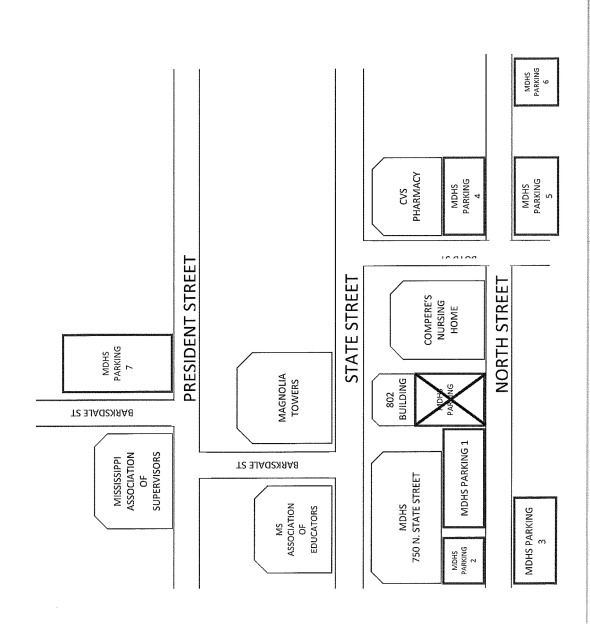
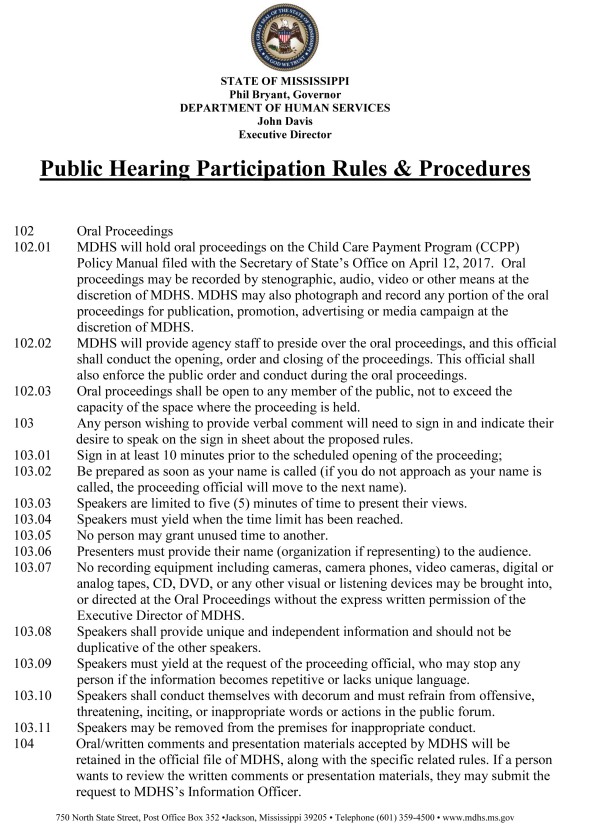
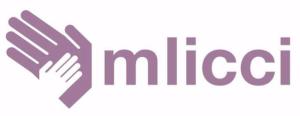
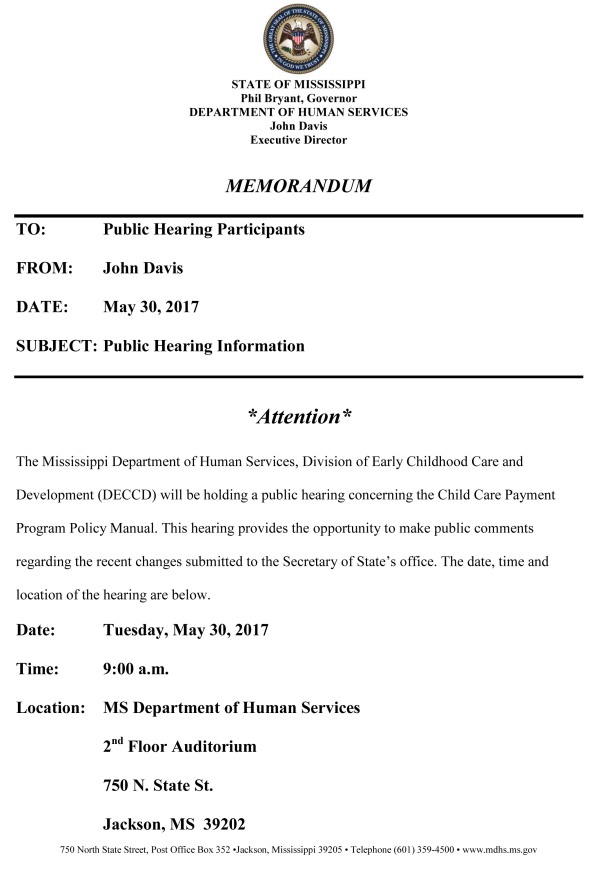
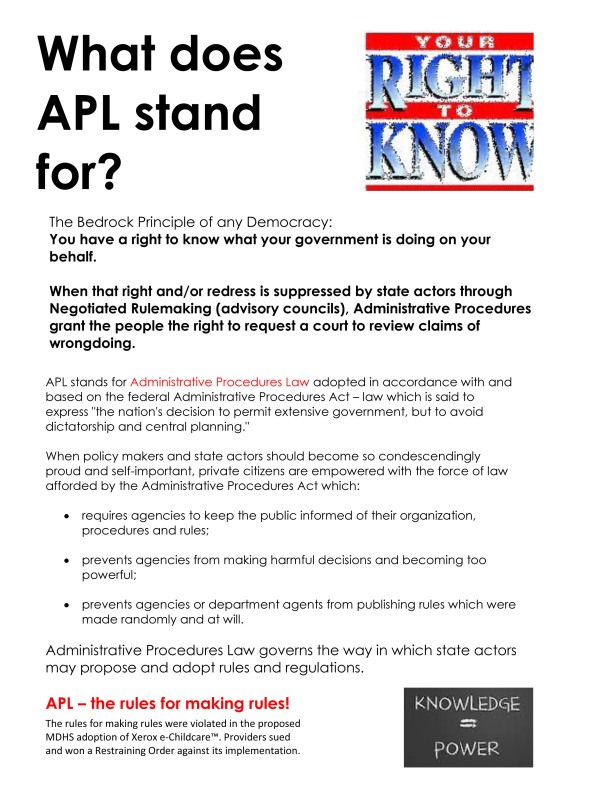
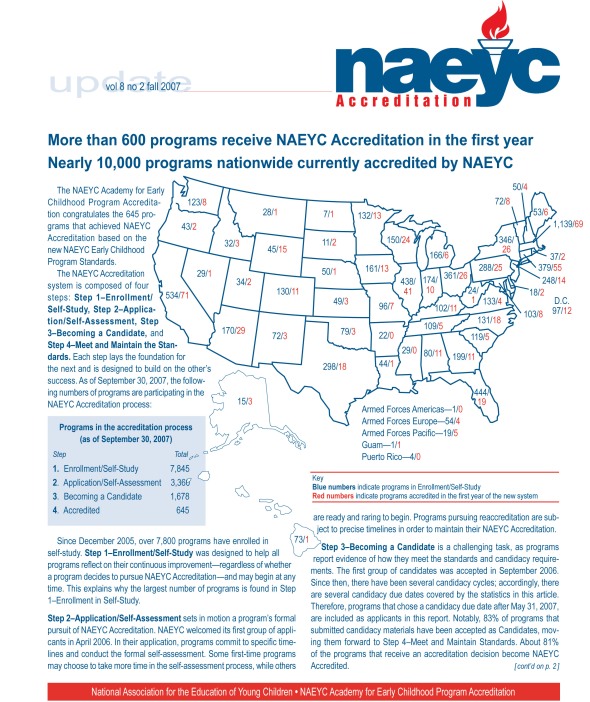

Recent Comments